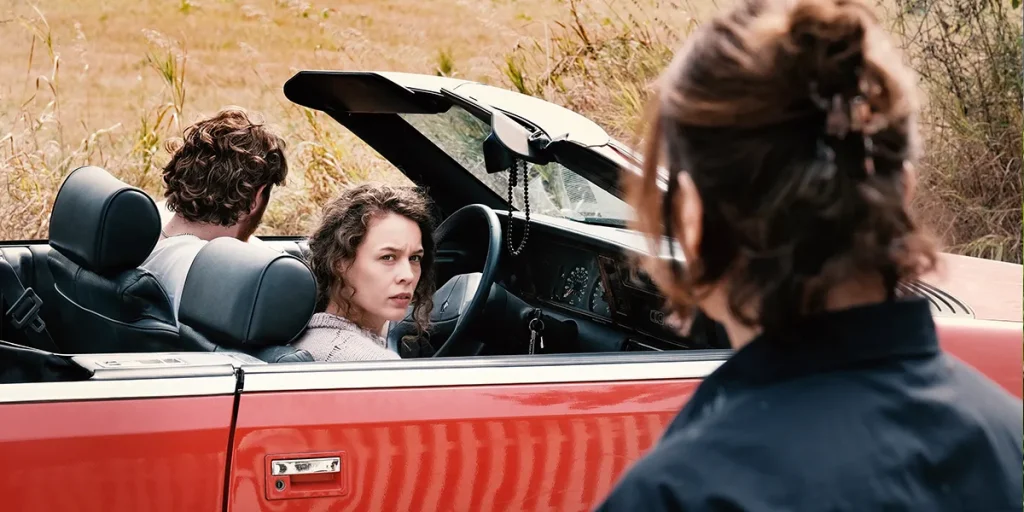An indefinable sense of mystery lends Christian Petzold’s Miroirs No. 3 some atmosphere, but it also keeps it at a distance.
Director: Christian Petzold
Genre: Drama, Mystery, Thriller
Run Time: 86′
BFI London Film Festival Screening: October 10-11, 2025
U.K. Release Date: TBA
U.S. Release Date: TBA (AFI Fest screening on October 24)
The films of Christian Petzold grapple with ideas of separation. His characters are often operating at a remove from the world around them. At least one character will deal with the enforced absence of a partner (Transit), a home (Afire) or even a life once lived (Phoenix). Miroirs No. 3 continues in that vein, as a young woman’s depression keeps her sedate, only for a grievous loss and a family in a similar stasis to shake her world up.
All very usual for Petzold, but he adds a layer too many of metaphor and mystery to Miroirs No. 3 that muddies the thematic waters, and ironically separates the audience from the film’s emotional beats.
Miroirs No. 3 is populated by a cast of Petzold’s regular ensemble. In her fourth collaboration with the writer-director, Paula Beer plays Laura, a university student whose hundred-mile stare and social alienation hint at a depressive mindset. However, this is shaken up suddenly and violently when, in a fit of frustration at her social awkwardness, Laura’s boyfriend (Philip Froissant) crashes their car on a country road, killing him but leaving her with just cuts and bruises.
Lest you be spoiler-phobic, this all happens in the first ten minutes. This is just the inciting incident. We don’t even see it happen, only hearing the offscreen groan of metal on stone. Petzold has no time to show us the accident; he has other dramas to get to. Indeed, he’s in such a rush that Laura scarcely mentions the boyfriend again over the film’s sparse runtime. Petzold avoids an obvious plot arc about trauma, and creates an uncanny tension from undermining audience expectation, but the story’s verisimilitude forever threatens to ebb away.
The accident happens down the road from the house where Betty (Barbara Auer) lives. Laura and Betty exchange glances as the car passes just before, as if some psychic bond led the young student to this woman’s doorstep. Petzold’s script flirts with suggestions of fate and cycles of history, but he is more interested in creating an unspoken unease. Laura asks Betty if she can stay at her house while she recuperates, and Betty agrees, offering her shelter, food and clothing with no questions asked.
The kindness of this stranger is eager and heartfelt, but it thrums with a lingering unspoken motive. Miroirs No. 3 plays like a lo-fi David Lynch film. It may not have dwarves, flashing lights or blue rooms, but it does have a sense of a sad and violent past that pins Laura to Betty’s home, and a sense of foreboding that pins the audience to the seat to see where this will go (Also, the names Laura and Betty are straight out of Lynch’s playbook). DoP Hans Fromm’s camera scarcely goes handheld, with steady shots from a tripod observing the action like some benevolent force watching proceedings from afar. The rural setting, with its rugged roads and parched autumnal fields, adds to the creeping isolation.
The feeling of unease is compounded when Laura learns that Betty’s husband (Matthias Brandt) and adult son (Enno Trebs) don’t live at home. As the family warm to their new guest, and their cagey behaviour re-emerges in fits and bursts, the lingering questions that have been bubbling away in the background can’t be avoided for much longer. Running to just 86 minutes of screentime, Petzold’s script is just too slight in stature to sustain its mysteries or tension for as long as this story deserves.
It centres on a compellingly impenetrable lead, with Beer guarding Laura’s secrets with riveting inscrutability. We never fully establish what lies at the roots of her depression, or even identify what age she is. Yet the possibilities afforded by Beer’s performance and Petzold’s characterisation are sidestepped for a mysterious plot and mood that is intriguing in its own right, but lacks the complicated drama of Petzold’s best work.
Auer, Brandt and Trebs ably back Beer up with their performances, but Miroirs No. 3 loses focus, shifting from minor-key interiority to broader familial drama, with only a pervading mood and a half-hearted mystery to hold these diverging strands together. Petzold’s characters may be feeling separated from their sense of self, but by the end his film becomes separated from its own purpose, with the brief runtime and solid production saving it from breaking apart altogether.
Miroirs No. 3: Movie Plot & Recap
Synopsis:
After a traffic accident claims Laura’s boyfriend and leaves her injured, a neighbouring witness takes her in, but has motives of her own.
Pros:
- Petzold creates a palpable sense of mystery from the rural setting and inscrutable characters.
- Beer leads a uniformly superb cast.
Cons:
- Petzold can’t sustain his mysteries for long, with a brief runtime making this feel slight by default.
- The narrative takes some predictable turns, and the character’s distance from the emotions makes these turns hard to swallow.
Miroirs No. 3 was screened at the BFI London Film Festival on 10-11 October, 2025. In the U.S., the film will be screened at the AFI Fest on October 24, 2025. The release date is TBA.

